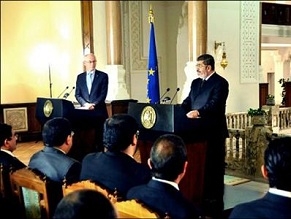|
World Jewish News

European Council President Herman Van Rompuy (L) and Egyptian President Mohammed Morsi speak at a press conference in Cairo.
|
EU leader pays tribute to Egypt as ‘major actor in international community’
15.01.2013, Israel and the World European Council President Herman Van Rompuy on Sunday heralded “a new chapter” in Egypt’s history following a meeting with Mohammed Morsi in Cairo, as he called on the Islamist President to use his success in brokering November’s Gaza ceasefire as motivation “to take bold steps towards peace in the Middle East”.
“Egypt clearly is a key player here, and the European Union looks forward to working with your country for the re-launch of direct and substantial negotiations, without preconditions, among the parties in the Palestinian-Israeli conflict,” he continued, as he called for the emerging Arab democracy to work together with the EU towards the goal of achieving “a lasting solution ending all claims”.
In the first direct meeting between a European representative and Morsi since te contentious constitutional referendum late last year, the climate of which was marred by widespread reports of electoral irregularities, Van Rompuy made scant reference to the “worrying development in the last weeks”, instead outlining the significant progress towards democratic transition already undertaken, reiterating that “in order to achieve genuine progress towards deep and sustainable democracy, it is so important to ensure consensus building, inclusiveness, and dialogue among all parties concerned”.
Ahead of his move to Alexandria Monday to round off a two visit to the country, Van Rompuy concluded by speaking of the government’s “enormous responsibility, to secure a better and democratic future for the whole Egyptian people and more particularly for its youth”, cautioning that “the world is watching what happens in Cairo”.
Ending his statement on a more positive note of friendship, however, he vowed that “on this path, the European Union will stand by as your friend, a neighbour and a partner”.
Last month at a topical debate with members of the European Parliament’s foreign affairs committee on the escalating Egyptian constitutional crisis, the EU Special Representative for the Southern Mediterranean Region Bernadino Leon was forced to fend off criticism from MEPs contending that the much-touted EU-Egypt Taskforce which closely preceded the latest democratic controversy was a smokescreen fr what was to follow in the country.
After Belgian Liberal Democrat Annemie Neyts-Uyttebroeck, who having herself accompanied the EU-Egypt Taskforce on its recent visit to Cairo, charged that “I couldn’t help having the impression that some of the answers we got in discussion with our counterparts from the council and journalists, that we were getting the answers they knew we would like to hear”, Leon insisted that the timing of the last meeting, mere weeks before the constitutional flare-up had marked a very important “beginning of a process between the EU and Egypt”, with its joint statement having highlighted the importance of promoting peace, overriding respect for justice, social development, the rule of law and human rights.
“So now our Egyptian counterparts know better what they can expect from the EU in terms of support, but they also know the way they can get it and the way they cannot,” he added.
However, whilst acknowledging the key role Morsi played in brokering the ceasefire in Gaza last month, Neyts-Uyttebroeck persisted: “I feel at least embarrassed about President Morsi co-chairing one of the meetings of the taskforce and proclaiming his commitment to democracy, and a few days later issuing the decree we’re debating and of which none of us approves”.
Supporting her position, Italian Socialist Democrat Pier Antonio Panzeri contended that Morsi had manipulated the international recognition for his diplomacy in Gaza “to carry out the action we’re discussing”. Disputing the Special Representatives insistence that the solution was “more Europe”, he suggested “raising our voices more” in condemnation of the “dubious democratic nature” of the then-draft constitution.
In an apparent rebuff of calls by fellow taskforce member Spanish Christian Democrat Jose Ignacio Sanalfranca Sanchez-Neyra to freeze aid to Egypt in response to the worrying developments, however, Van Rompuy further declared Sunday that the EU planned to “to honour our commitment” to the Egyptian economy, which has seen the EU commit more than €5 billion ($6.5 billion) “in grants concessional loans and loans for the period 2012-2013 in support of Egypt’ democratic transition”.
EJP
|
|
